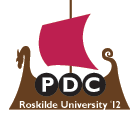| INDUSTRY CASES | WEDNESDAY 14:00-15:15 | GRAND AUDITORIUM |
Challenging Contexts
Session chair: Andrea Botero, Aalto University
Opening address by Jens Andersen, Managing Director of Region Zealand
Correlation with aspiration for change: A case study for restoration after natural disaster
Mika Yasuoka, Kyoto University
Ryo Sakurai, NTT Data Institute of Management Consulting
Abstract. In this paper, we present a participatory design (PD) case for public good, The Reborn Japan Project. The Reborn Japan Project was initiated after a historically devastating earthquake and tsunami disaster occurred in early spring 2011 in Japan. The case reports on the uniquely organized structure of the project, scope of stakeholders, and targets for design. Through participatory investigation and discussion among a wide range of stakeholders, the project aims at creating practical as well as visionary ideas for economic and social restoration after the disaster, in which higher uncertainty and more complex challenges are of more essential significance than with a conventional design task. With this case, we report lessons of the use of PD for public good. Our case indicates that there is a strong correlation between applicability of PD and a strong aspiration for change for such highly public nature projects.
Using participatory design methods to engage the uninterested
Mariesa Nicholas, Inspire Foundation
Penny Hagen, University of Technology
Kitty Rahilly, Inspire Foundation
Nathalie Swainston, Inspire Foundation
Abstract. Engaging young people on issues relating to mental health can be challenging. Although young people have their own health and wellbeing goals, their perception of these issues can be radically different to those of mental health professionals. The Inspire Foundation is a not-for-profit organisation committed to working in partnership with young people to understand their needs and perspectives on mental health and wellbeing, and to designing and delivering relevant services with those young people. This case study documents how participatory design techniques and principles were used to engage young people who have not used mental health services in designing services that would be relevant to them. Specifically, we will share the methods we used in a series of co-design workshops to engage young people in the redesign of the online service ReachOut.com, and the role participatory design principles, such as play, co-operative and mutual learning and design-by-doing had in making these workshops a success.
Lessons learnt from the participatory design of a mobile care data application in a resource-restricted context
Retha de la Harpe, Cape Peninsula University of Technology
Abstract. This case describes the participatory process of developing a mobile solution for care givers in a resource-restricted context. The experiences of the designers and developers during this process are shared. mHealth solutions are not yet widely adopted for care giving services and the lessons learnt could be valuable to others designing similar solutions. The literacy level of the care givers as end-users was an important consideration for selecting the right methods to involve them in the design of the solution. It was a challenge to design the solution for the kind of mobile phones used by the care givers in these poorer communities since these phones have limited functionality. The design of the mobile solution as well as the process to involve the end-users were therefore influenced by the constraints of the context of use.
